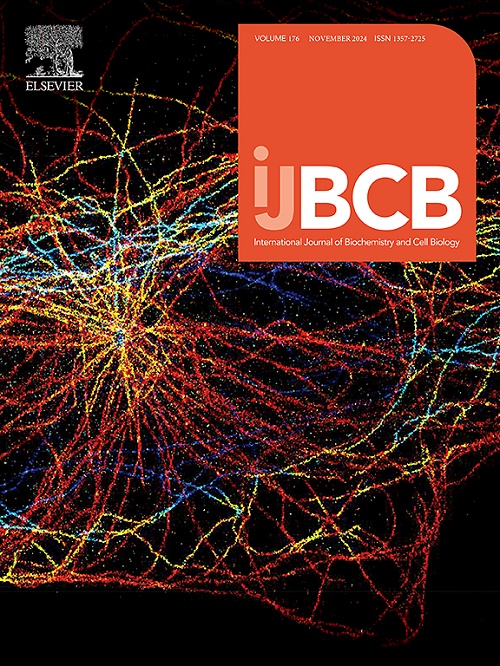冬眠棕熊血清调节人体肌肉细胞中TGF-β和BMP通路的平衡
IF 2.8
3区 生物学
Q2 BIOCHEMISTRY & MOLECULAR BIOLOGY
International Journal of Biochemistry & Cell Biology
Pub Date : 2025-09-19
DOI:10.1016/j.biocel.2025.106864
引用次数: 0
摘要
在一些病理生理情况下,包括缺乏身体活动,可以观察到肌肉萎缩,导致负面的健康后果,目前没有任何有效的治疗方法。相反,棕熊在冬眠期间抵抗肌肉萎缩,尽管长时间不运动和禁食。我们以前报道过冬眠的棕熊血清会增加人肌管中的蛋白质含量并抑制蛋白质水解。更进一步,我们在这里破译了棕熊血清在人类肌管中使用大规模转录组学的转录效应。在48 h后,与夏季活跃熊(SBS)血清相比,冬冬眠熊血清(WBS)诱导了一个特定的转录组程序,主要影响与肌肉生长和BMP信号传导相关的生物学途径。WBS主要在mRNA和蛋白水平上降低BMP信号的激活剂和抑制剂,这与肌肉质量维持有关。此外,在WBS和SBS条件下培养的人肌管中,BMP活性对BMP7超生理浓度的刺激更敏感。同时,WBS还上调促萎缩TGF-β通路抑制基因的表达,降低磷酸化的SMAD3核蛋白水平,下调TGF-β靶基因。此外,WBS治疗导致TGF-β3生理浓度刺激的人肌管中TGF-β信号反应性降低。总体而言,尽管与TGF-β途径相比,WBS诱导的BMP转录组变化更大,但对TGF-β途径的功能影响更为明显,具有明显的抑制作用。本研究提示WBS中的生物活性化合物可能通过调节TGF-β/BMP平衡,在分解代谢状态下保护人体肌肉细胞。这些发现为针对肌肉萎缩的治疗开辟了新的视角。本文章由计算机程序翻译,如有差异,请以英文原文为准。
Hibernating brown bear serum modulates the balance of TGF-β and BMP pathways in human muscle cells
Muscle atrophy is observed in several pathophysiological situations, including physical inactivity, leading to negative health consequences, without any effective treatment currently available. Conversely, brown bears resist muscle atrophy during hibernation, despite prolonged physical inactivity and fasting. We previously reported that hibernating brown bear serum increases protein content in human myotubes and inhibits proteolysis. To go further, we deciphered here the transcriptional effects of brown bear serum in human myotubes using large-scale transcriptomics. After 48 h, the winter-hibernating bear serum (WBS) induced a specific transcriptomic program, affecting mostly biological pathways related to muscle growth and BMP signalling, compared to the summer-active bear (SBS) serum. WBS predominantly reduced, at mRNA and protein levels, activators and inhibitors of BMP signalling, which is associated with muscle mass maintenance. Moreover, BMP activity was more responsive to a stimulation by BMP7 at supra-physiological concentrations in human myotubes cultured in WBS versus SBS conditions. Meanwhile, WBS also up-regulated expression of genes encoding repressors of the pro-atrophic TGF-β pathway, decreased phosphorylated SMAD3 nuclear protein levels, and down-regulated TGF-β target genes. Furthermore, WBS treatment resulted in reduced TGF-β signalling responsiveness in human myotubes stimulated with TGF-β3 at physiological concentrations. Overall, even though WBS induced larger transcriptomic changes in the BMP compared to TGF-β pathway, the functional consequences were more pronounced for the TGF-β pathway with a marked inhibition. This study suggests that bioactive compounds in WBS may protect human muscle cells during catabolic situations, by regulating the TGF-β/BMP balance. These findings open new perspectives for therapies targeting muscle atrophy.
求助全文
通过发布文献求助,成功后即可免费获取论文全文。
去求助
来源期刊
CiteScore
8.10
自引率
0.00%
发文量
124
审稿时长
19 days
期刊介绍:
IJBCB publishes original research articles, invited reviews and in-focus articles in all areas of cell and molecular biology and biomedical research.
Topics of interest include, but are not limited to:
-Mechanistic studies of cells, cell organelles, sub-cellular molecular pathways and metabolism
-Novel insights into disease pathogenesis
-Nanotechnology with implication to biological and medical processes
-Genomics and bioinformatics

 求助内容:
求助内容: 应助结果提醒方式:
应助结果提醒方式:


